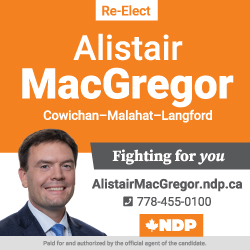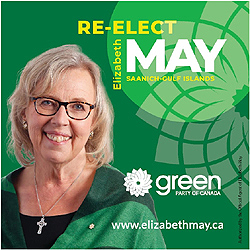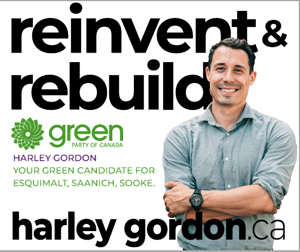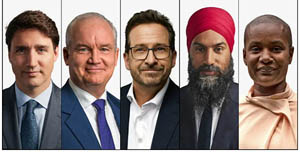
Tuesday September 7, 2021 | NATIONAL
EDITORIAL commentary by Mary P Brooke, Editor | Island Social Trends
Coming up on Thursday night September 9 is the one and only nationally-televised federal party leaders debate in English during this 44th federal general election. (The first debate in French was held last week, and the next one is tomorrow night.)
- Wednesday September 8 – federal leaders debate in French | 5 pm Pacific Time
- Thursday September 9 – federal leaders debate in English | 6 pm Pacific Time
Political pundits will watch, with great intent. Engaged voters will watch, to listen for perhaps something new or to fill in a blank they’ve been wondering about. And folks that are party faithful will tune in for sure, to hear the leader of their team do his or her best.
Convincing, or not?
Fundamentally, these televised/livestreamed debates are done to convince people of which way to vote. Most are already convinced, and by way of that will tune out the bickering and verbal jabs that generally turn off the average viewer who is just looking for some sort of clue as to which of the politicians they’re watching will be the best shot for prime minister.
The average viewer among that all-important group of independent (undecided) voters, if they tune in at all, is hoping to get what they came for (some sort of tidbit to help them decide who to vote for). They may even have the patience to sit through two hours of verbal fist fights; few are motivated to endure that.
Media-driven phenomenon:
These debates are a media-driven phenomenon. The broadcasts generally boost TV ratings and sells ads. The party leaders are put into the spotlight where they might shine, or they could end up being hung out to dry. It makes for high-energy viewing.
But one slip-up, one bad moment, and a campaign can be derailed. Or there can be one shining moment and it’s like, well, the game of Snakes & Ladders, where the candidate suddenly by sheer luck shoots fast to the top.
The old-style media approach that looks for the knock-out punch or ‘winner’ of a debate is not of good service to people who seriously want to learn from these debates (about the issues, the candidates). Why does someone need to ‘steal the spotlight’ or make a fatal blow? Hopefully the party leaders bring their best to the night’s event, maybe even raising the bar a notch or two for the benefit of viewers (and themselves).
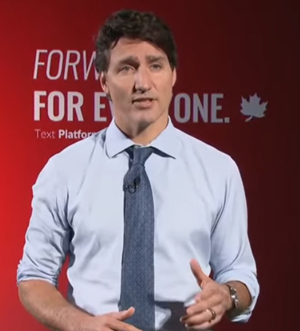
Global TV published today about the upcoming debates, with this headline: “If you’re hoping for some TV drama, this week’s debates might deliver.” This sort of thing ramps up fire in the bellies of party-faithful and people just looking for some entertainment. But it may not serve the better interest of the political process, unless of course that’s just to try and drum out as many viewers (who might also be people intent on voting) as possible.
The players & the themes:
Participating in the English debate on September 9 will be five party leaders: Liberal Leader Justin Trudeau, Conservative Leader Erin O’Toole, NDP Leader Jagmeet Singh, Bloc Québécois Leader Yves-François Blanchet, and Green Party Leader Annamie Paul.
CBC has published “How to Watch the Leaders’ Debate” in which the debate themes are outlined:
- Affordability
- Climate
- COVID-19 recovery
- Leadership and accountability
- Reconciliation
The leaders will be asked questions crafted by the journalists participating in the debate, based on concerns submitted by Canadians. A public call-out by the broadcast partners brought 20,2021 English-language responses. Both events will be held at the Canadian Museum of History in Gatineau, Quebec, overlooking Parliament Hill.
Turned-off, tune-out:
When people get turned off by debates they don’t tune in. Or worse, they tuned in with some level of expectation that then becomes dashed.
If party leaders in this election hope to gain votes by way of the debate, hopefully they are bringing their best points to the podium and camera lens on Thursday night.
Anyone watching who has tuned in for some new insights, or to hear a reply about a policy point they’ve been wondering about, can be turned into a voter if they aren’t turned off for having watched.
Today’s older Canadians have seen a number of these debates over the years. For them, the debates have a reputation of being scrappy, hard to watch, even not worth watching. New voters may have never tuned in before.
Today NDP Leader Jagmeet Singh when asked about people watching the debates — what they might learn, why they should bother — emphasized that the most important thing is to vote. In other words, he doesn’t see the debate process as necessarily impacting things one way or another.
At the media’s mercy:
Indeed, with all the best of intentions and expectations for any of the debaters, things can go sideways fast. One topic can catch fire and then other important topics don’t even get airtime. One candidate can luck out with the better camera angle, and for some that matters. And the moderator can also to some degree make or break a debate — not only with their management style but the package of biases they might bring to the event.
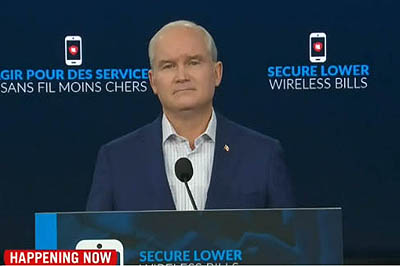
The next day Canadians will hear about who ‘won’ the debate, or who had the most memorable 10-second quotable quote. For any politician who may fall onto the sword of such chicanery, is an unfortunate pitfall of the way mass media manipulates the electoral process.
If the political leaders (and media outlets) are fortunate enough to have a good viewership for the debates, hopefully they help Canadians feel respected by the process and there are worthwhile outcomes for the candidates and their campaigns.
English last of three:
A final point — why three national debates, and two of them in French? Each election cycle seems to have a different offering of all party leaders in one spot for an hour or two.
This time around, the English debate is the third and last. Doing a long debate takes up the leader’s time for preparation, then a day generally away from the campaign trail, and then recovery if not damage control afterward. And they can be physically and mentally exhausting (the first French debate was two hours non-stop last week, under hot TV lights).
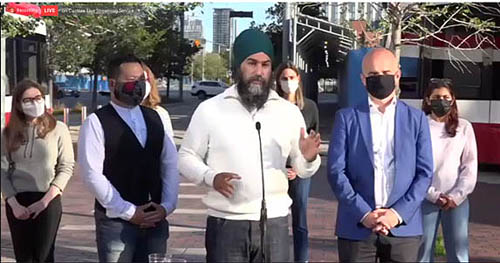
By the time English-speaking Canada hears the leaders on Thursday night, they may have already ‘heard enough’ from the translated clips of the French debates, and even die-hard political enthusiasts will be narrowing down their filters to listen to ‘anything new’.
For English-speaking Canadians outside of Quebec, it can still be puzzling as to how powerful the Quebec vote is (in terms of seat results in the House of Commons) and how the influence of a provincially-based party (the Bloc Quebecois) can so blatantly tip the national interest.
Debates for show, but also a responsibility:
Good that mass media brings us access to these powerful politicians who impact so much about our country. But putting on a show… that’s both a marketing challenge and a civic responsibility. In the age of high-definition TV, instant replay, and fast-action social media, hopefully the politicians get the best fighting chance to reach the eyes and ears of the voters that they’re out to capture anew or reliably retain.
This is such an important election, in a time of climate crisis and pandemic, when many people’s lives are going through indelible change. If this debate can give hope to anyone who watches about leadership that can guide Canadians through difficult times, that will be the best outcome of all.
Especially those all-important Canadians who may not normally vote, or even tune into debates. If they somehow are encouraged to tune in, that’s a bonus!
Tips for watching the debates:
- Watch the body language. Who is sincere about their message, or at least committed to their process.
- Decide ahead of time what topics are most important to you, and listen for how each candidate answers them.
- You probably know which way you lean already. But what do the other candidates offer to your world view?
- What will ‘move the marker’ for you regarding your favourite (or any) candidate? Their answer about a specific topic, or the candidate’s overall way of handling the flow of the debate?
- If you come away unconvinced or unsure, how will that affect your vote?



